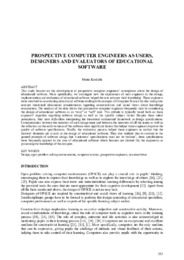Prospective computer engineers as users, designers and evaluators of educational software
Abstract
This study focuses on the development of prospective computer engineers’ conceptions about the design of educational software. More specifically, we investigate how the experiences of such engineers in the design, implementation and evaluation of educational software helped them to enhance their knowledge. These engineers were involved in constructing educational software dealing with concepts of Computer Science by also taking into account theoretical educational considerations regarding constructivism and social views about knowledge construction. The analysis of the data shows that prospective computer engineers frequently start by considering the design of educational software as an “easy” or “soft” task. This attitude is typically based both on these engineers’ expertise regarding software design as well as the specific subject matter. Despite these initial perceptions, they have difficulties interpreting the theoretical educational framework in design specifications. Communication between the members of each design team and between the members of all the teams as well as the reflection on the early versions of the software were significant factors that helped these engineers improve the quality of software specifications. Finally, the evaluation process helped these engineers to realize that the learners’ demands are crucial in the design of educational software. They also realized that in contrast to the general principle of software design that ‘customers’ specifications must not be violated’, these specifications were frequently ignored in the case of educational software where learners are viewed (by the engineers) as possessing the knowledge of the designer.
